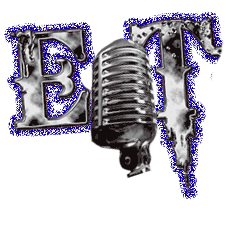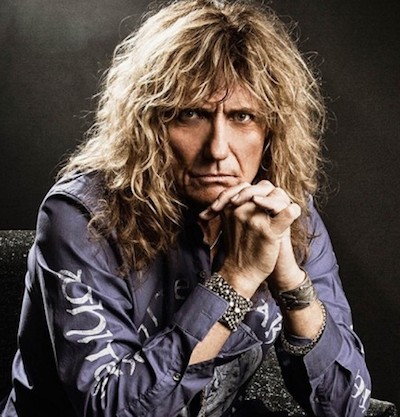Matt Wardlaw of Ultimate Classic Rock spoke with Whitesnake frontman David Coverdale on the their eponymous’87 album, which will be released as Super Deluxe Edition on October 6th. Highlights from the discussion, appear below.
UCR:Your Twitter account is always quite entertaining. How much time would you say you spend tweeting? Do you have those pictures that you tweet out on your computer or do you dig that stuff out?
David Coverdale: It’s interesting. I have a network of friends that we’ve always had — and some very well-known people. We share funnies and s— that we think is amusing. And if it isn’t too blue or whatever, I’ll use it for Twitter. When I started getting involved with social media, it would take significantly more time for me when I had the Whitesnake.com BBS, the bulletin board. Because that would be more like me doing interviews with people. It was fascinating, because the fans asked a lot of questions that most journalists don’t f—ing bother with. A lot of journos don’t do the research — it’s just another gig to them. To me, I try to make each interview more of a conversation, but interesting and not the same. But I can’t really give too many alternate answers if the questions are all the f—ing same.
[Interacting on the bulletin board] took an awful lot of my time. But when Twitter started, it’s just nothing. I just take my phone out. My sole purpose of being involved in social media is information, entertainment and interaction. If the internet stopped tomorrow, it wouldn’t affect my life at all. It’s just like now, we have millions of people who act as A&R men and women for us.
UCR: Looking at the story of [the ’87] album, it seems like you really had an adventure just making it. Put to the side for a second how successful this album ends up being, there was probably a moment when you got finished making the album, where you’re just glad that you ended up with a finished record.
David Coverdale: I thought I was done. I thought it was over. I thought it was “Stick a fork in me, I’m done.” I was very substantially in debt due to not working for two or three years, and there had been terrible advantages taken while I was recovering from [sinus] surgery and unable really to function in a professional environment. And people who I trusted, I found out I couldn’t trust. So, the album became extraordinarily expensive — the most expensive Whitesnake album ever. And it was minimal to do with me. [Laughs] So that was the primary reason — for me, in a relationship, if you can’t trust your partner or partners — it’s time to move on. I had flown home from a very sad Christmas holiday with my daughter in Munich and she was kind of punishing me, understandably, because I’d left her mom. So I flew home from Munich to L.A., pretty depressed about it and very sad.
I was living in a beautiful hotel in Los Angeles at the time called the Le Mondrian. In those days, it was a hand-painted hotel that looked like Piet Mondrian’s work, created by an Israeli artist called [Yaacov] Agam. It’s different now — it’s a Philippe Starck place, I think. But you know, it was pretty happening. I knew the owners, and they knew I was looking for apartments and they offered me a beautiful suite at the hotel, so I had the life of whoever f—ing Riley is for like three years or something, until Tawny [Kitaen] and I made a commitment to each other. It was amazing. I got back to the hotel completely exhausted from the journey, emotionally and physically, and I also got the flu. So I walk into my suite, just a basket case and sitting there is a production cassette from Geffen, with a completely different running order than I’d proposed, so I knew it was [John] Kalodner. And what I should have done is just have a hot bath, gone to bed and listened to the thing fresh the next day. But no, no, no — exhausted, f—ed-up me puts the headphones on, cranks it up and I thought it was awful. I just couldn’t hear it properly, you know [when you’re sick], how your ears, you lose all of the highs and stuff. Your hearing goes when you have the flu. I thought it just sucked on ice. And so I thought, “Well, I’m done. I’m completely f—ed.”
But amazingly, it was filtering out to [people] like Doc McGhee and other people would be calling me going, “F—, I just heard your album, it’s amazing.” So it was other people’s responses and reactions that actually got me to listen to it with fresh ears. I was ready to [say] “F— it, I’m done.” And then I started hearing it. I started to work with Marty Callner on preparing for the videos and stuff and suddenly the f—ing world just explodes. I remember thinking a lot of my youth was black and white, you know, monochrome in post-war England. Everything seemed to be black and white, and then the Beatles came along and everything looked like f—ing rainbow colors. Well, I had my own little experience like that. It was astonishing. I was almost three million dollars in debt and in three months, I was in credit. That’s how extraordinary it was…
Speaking about the deluxe edition:
We could have actually made it an even bigger project than we did. But I’m very happy with what we came out with. One of the things specifically is that you can hear as [John] Sykes and I are introducing these brand new songs to each other on the Evolutions CD…It’s the most played f—ing thing from that project when I’m working out or whatever. And there was a couple more songs, but John’s people didn’t get back to us in time before we had to pull the plug on the deadline. But it started off, like, Is This Love was for Tina Turner originally. EMI had asked me, and then David Geffen said, “You’re f—in’ keeping it!” And thankfully so. Arrogantly, I scream at the beginning of it, “This is a chorus that will take over the world” — and it f—ing did! I am at least a man of my word. But the bonuses, it took me back to, at that time, John and I were really good. You can hear the creativity, the juice, the electricity between us, the attitude, my singing.
It’s only cassette copies that we ran through restoration apps forever to get as good quality as possible for the fans, but you can hear the potential of John Sykes and David Coverdale, when there was no one else around us. It’s when we took everything to Los Angeles, and then L.A. started f—ing around with us, for whatever reason, things started to unravel somewhat. But it was really when I was recovering from surgery that suddenly I find out, I’m getting invoices, my accountant is getting invoices from Toronto, from f—ing London, it’s like, who the f— is doing this? Who is signing off? So I just went, “Stop, right now. Pull the plug.” We ended up finishing off the album with Keith Olsen. So it was the most fractured record I’d done and still is today. It’s still a f—ing handsome seller, to be perfectly honest with you, in a changed industry. But my God, talk about a game changer, it was huge.
Read more at Ulitmate Classic Rock.
source: ultimateclassicrock.com


13 Responses
Crying in the Rain……Bad Boys……Still of the Night. Are there three better songs to start any album?
Maybe…”Over The Mountain” / “Flying High Again” / “You Can’t Kill Rock And Roll?” Or…”Good Times Roll” / “My Best Friend’s Girl” / “Just What I Needed?” There are others, I’m just too tired to thumb type anymore!
… (second wind) have to mention… “Don’t Stop Believin'” / “Stone In Love” / “Who’s Crying Now” / – Slippery When Wet, New Jersey, damn bro, you had to make me think?! LOL! 😉
The Hellion/Electric Eye–>Riding on the Wind–>Bloodstone; takes the prize as far as I’m concerned, with Van Halen’s first record second
Destroyer third.
Kiss really started this sequencing thing where you follow up the opener with a song that could also open…it’s like a one-two-three punch…and I have to say Kiss really made that impression first with Destroyer; an 80s metal template.